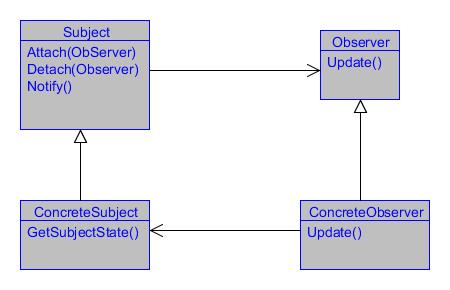Introduction
This article presents the basics of Observer Pattern, when to use it and how to implement it in C++. I have posted a similar article that talks about the Observer pattern in C#. The main aim of this article will be to implement the observer pattern in C++.
Background
Many a times, we need one part of our application updated with the status of some other part of the application. One way to do this is to have the receiver part repeatedly check the sender for updates but this approach has two main problems. First, it takes up a lot of CPU time to check the new status and second, depending on the interval we are checking for change we might not get the updates "immediately".
This problem has one easy solution, i.e., Observer Pattern. This is my own second article on Observer Pattern. I have a similar article talking about Observer Implementation in C#. I think this article is also worth sharing, as it could be useful for the C++ beginners and also the valuable comments I get on the article will let me learn more.
Here is the class diagram for Observer Pattern(Reference: GoF Design Patterns)

Using the Code
Let us now discuss all the classes one by one:
Subject: This class keeps track of all the observers and provides the facility to add or remove the observers. Also it is the class that is responsible for updating the observers when any change occurs. In our solution, we haveASubjectimplemented for the same purpose.ConcreteSubject: This class is the real class that implements theSubject. This class is the entity whose change will affect other objects. We haveDummyProjectclass implemented for the same.Observer: This represents an interface that defines the method that should be called whenever there is change. We have implemented this asIObserver.ConcreteObserver: This is the class which needs to keep itself updated with the change. This class just needs to implement theObserverand register itself with theConcreteSubjectand it is all set to receive the updates. We haveShopclass in our application serving the same purpose.
The Subject: ASubject
//Header File
#pragma once
#include <vector>
#include <list>
#include "shop.h"
class ASubject
{
//Lets keep a track of all the shops we have observing
std::vector list;
public:
void Attach(Shop *product);
void Detach(Shop *product);
void Notify(float price);
};
//CPP File
#include "ASubject.h"
#include <algorithm>
using namespace std;
void ASubject::Attach(Shop *shop)
{
list.push_back(shop);
}
void ASubject::Detach(Shop *shop)
{
list.erase(std::remove(list.begin(), list.end(), shop), list.end());
}
void ASubject::Notify(float price)
{
for(vector::const_iterator iter = list.begin(); iter != list.end(); ++iter)
{
if(*iter != 0)
{
(*iter)->Update(price);
}
}
}
The ConcreteSubject: DummyProduct
//Header File
#pragma once
#include "ASubject.h"
class DummyProduct : public ASubject
{
public:
void ChangePrice(float price);
};
//CPP File
#include "DummyProduct.h"
void DummyProduct::ChangePrice(float price)
{
Notify(price);
}
The Observer: IObserver
#pragma once
class IObserver
{
public:
virtual void Update(float price) = 0;
};
The ConcreteObserver: Shop
//Header File
#pragma once
#include <iostream>
#include <string>
#include "IObserver.h"
class Shop : IObserver
{
//Name of the Shop
std::string name;
float price;
public:
Shop(std::string n);
void Update(float price);
};
//CPP File
#include "Shop.h"
Shop::Shop(std::string name)
{
this->name = name;
}
void Shop::Update(float price)
{
this->price = price;
//Lets print on console just to test the working
std::cout << "Price at "<< name << " is now "<< price << "\n";
}
Testing the Code
int main(int argc, char* argv[])
{
DummyProduct product;
// We have four shops wanting to keep updated price set by product owner
Shop shop1("Shop 1");
Shop shop2("Shop 2");
product.Attach(&shop1);
product.Attach(&shop2);
//Now lets try changing the products price, this should update the shops automatically
product.ChangePrice(23.0f);
//Now shop2 is not interested in new prices so they unsubscribe
product.Detach(&shop2);
//Now lets try changing the products price again
product.ChangePrice(26.0f);
getchar();
return 0;
}